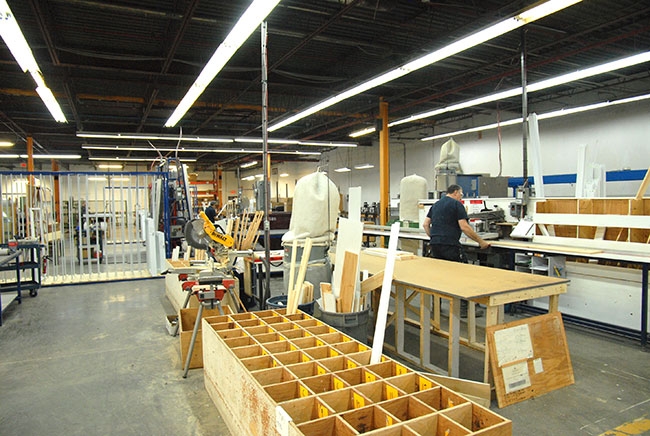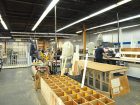
Articles
Dealer’s Corner
Portes et fentres President: Success with style
A new generation takes the reins at Président.
March 5, 2019 By Carroll McCormick
 Bernard Létourneau installs wood components on Président’s 11,000-square-foot production floor. The company is vertically integrated, taking retrofit projects from design right through installation. Credit: Carroll McCormick
Bernard Létourneau installs wood components on Président’s 11,000-square-foot production floor. The company is vertically integrated, taking retrofit projects from design right through installation. Credit: Carroll McCormickWith the transfer last fall of Portes et fenêtres Président by founders Christiane Parent and Yvan Houle, the new owners – their two children and an entrepreneur – see growth opportunities and regulatory challenges ahead.
It is near the end of the work day at Portes et fenêtres Président, located on Montreal’s South Shore, in the industrial park framed by Highway 132 and Autoroute-20. An automated welder rotates a large window frame and a router trims away excess PVC. Staff, surrounded by work tables, dust collectors, jigs and bins of stock, cut PVC-wrapped wood pieces to length, attach hardware and install window screens. The production area, increased by 11,000 square feet three years ago, is spacious and quiet. It gets much busier when all hands are on deck.
Marie-Pier Houle, the founders’ daughter, left her career as a paralegal five years ago to join the company as director of administrative services when Parent retired. “It started as a family company with my parents. Now it is me, my step-brother Marc-André and Benoit. With Benoit joining us we call it a modern family now,” Marie-Pier Houle says.
Marc-André Villemure has been the director of operations since 2013. Formerly involved in technical operations at Montreal’s Olympic Stadium, Villemure joined the company in 2007. “I was the first employee to work here. I trained the first salesmen,” he says.
Benoit Dubord, a lawyer-turned-entrepreneur, bought into Président last year to round out the trio of co-owners in the role of CEO.
As second generation (well, two-thirds second-generation) owners, they are a bit of a rarity in the Quebec window and door industry, according to Dubord. “There is not a lot of transfer of ownership to the younger generation, a number of window companies having been sold or closed.”
Yvan Houle continues to contribute valuable industrial engineering expertise, which, for example, has made it possible for the company to purchase and modify second-hand equipment to meet Président’s needs. “He is the product development guy and he answers our technical questions. We prefer to buy second-hand and adapt the equipment. We reconfigure [equipment we purchase] every time,” Dubord says. A staff electro-mechanic keeps the equipment in good running order.
Not only is the passing of the family torch in this industry uncommon, but smaller players have been disappearing as the industry consolidates, Dubord says. “Take a picture 15 years ago and today. There are fewer manufacturers. Years ago, every town and village had a window and door manufacturer. No one has started a window and door manufacturing company since 2007.”
That was the year Yvan Houle, having accumulated some two decades of industry experience, founded Président. “He understood the products and the production lines. He had contacts across Canada. Yvan knew the industry,” Dubord says.
By 2016 the company had outgrown its original, 17,000-square-foot shop. “Ten years ago, the place was too big for us. Three years ago, it was too small,” Villemure says. Dubord adds: “We were fortunate enough to have a landlord with space for us to expand. We have excess capacity now. There is room to add machines and to add manufacturing capacity to the existing machines.”
While Président designs and manufacturers its own windows, it contracts others to make its doors to its own specifications and door hardware. It specializes exclusively in the retrofit market. “Our typical clients would be our relatives and neighbours, with a house built in the 1970s. They are homeowners,” Dubord says.
Dubord divides window manufacturers into three groups: those who make windows and doors for sale in renovation centres such as Réno-Depot and Rona; those who make windows and doors for sale by distributors or contractors out of specialty stores; and those who sell directly to customers. Président works in the latter niche, with some vertical integration that distinguishes it from its competitors.
“I think that is where Yvan did the best, and this is a differentiating factor for our business. He cut out the middleman. We are a fully integrated business here. We design and manufacture the products, do our own sales and marketing and our own installations and services. It allows us to better serve our customers,” Dubord explains.
As their website puts it, “… we select our installers for their competence, positive attitude and ability to install our products according to written protocols – all to maximize our products’ efficiency. Each of our installers is certified by the Régie du bâtiment du Québec [unofficially translated as the Quebec Building Authority].”
Dubord says, “At every step in the process we try to differentiate ourselves from the competition. We go to the client’s house, spend time at the coffee table, listen to them, propose products that meet their needs. We do a good job managing their expectations.
“Our installers follow a written protocol that indicates from A to Z how work should be done – from how to act with the customer to how to protect the house during the work, and which materials should be used, etcetera. We have an after-service sales team who can support the installers. It can come out and troubleshoot problems right away.”
Villemure adds, “Before we deliver the windows, we bring in a technician. Five percent of homeowners will have an unexpected surprise; for example, a plumbing or electrical problem.”
Marie-Pier Houle completes the thumbnail course in what Président offers its customers: “We can do carpentry. We can open up the wall wider, replace a window with a door, make a window smaller. We do that frequently.”
This is how the company interacts with the outside world. Inside its plant walls, things have evolved somewhat. For example, there is more automation. They changed to PVC frames (Président does not build aluminum or wood-framed windows). The operators have changed. Invisible to see in their assembled windows is a unique-in-Quebec product feature the company perfected: the PVC frames are filled with foam insulation.
While history has its place, the trio much prefers to talk about changes coming down the turnpike, such as expansion plans, challenging new regulations and environmental responsibility.
On expansion: “For us, there is still space to grow in our natural market. We are also looking to grow through strategic acquisitions in markets we are not in now and partnerships,” Dubord says. For example, he says, “Some clients want aluminum windows. There could be value in acquiring a manufacturer that makes aluminum windows.”
On new regulations, Dubord explains, “The government has proposed new code standards and Energy Star ratings for windows. We will see a lot of changes in the next few years. We will have challenges to keep meeting the requirements. There is a lot of pressure on the industry.
“The concern for manufacturers like us is market acceptance. We could have products that meet the new standards, but they are expensive. Triple-glazed is more expensive to make and transport, and more difficult to install. There is a reality check between government proposals and what the market will accept. There is uncertainty among manufacturers about code and Energy Star standards. The final requirements aren’t known, or when they will be put in force. What we know for sure is that the products we are making today will not be the products we will be selling in five years.”
On environmental responsibility: “Environment is a big buying tool. We are examining our manufacturing processes, for example, recycling. If you talk about trends in the industry, they are shaping products and customers. What we think will drive changes down the road is the environmental consciousness,” Dubord says.
As interesting, exciting and important as these things are, the trio have plenty of the usual day-to-day tasks to keep them busy, while also making changes that improve their game. One example was the recent rearrangement of the production line to eliminate a bottleneck and open up more floor space.
Président invests in its employees by participating in government training programs. “The government approached us with a program – 12 weeks in school – matched with employees from other companies to improve their trades. Two of our employees are in this program. They will come out of it with a diploma. We have also taken on students for internships. We invest in our people,” Marie-Pier Houle says.
Print this page


Leave a Reply